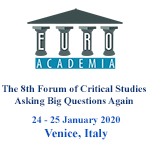Euroacademia Conferences
 Europe Inside-Out: Europe and Europeanness Exposed to Plural Observers (9th Edition) April 24 - 25, 2020
Europe Inside-Out: Europe and Europeanness Exposed to Plural Observers (9th Edition) April 24 - 25, 2020 Identities and Identifications: Politicized Uses of Collective Identities (9th Edition) June 12 - 13, 2020
Identities and Identifications: Politicized Uses of Collective Identities (9th Edition) June 12 - 13, 2020 8th Forum of Critical Studies: Asking Big Questions Again January 24 - 25, 2020
8th Forum of Critical Studies: Asking Big Questions Again January 24 - 25, 2020 Re-Inventing Eastern Europe (7th Edition) December 13 - 14, 2019
Re-Inventing Eastern Europe (7th Edition) December 13 - 14, 2019 The European Union and the Politicization of Europe (8th Edition) October 25 - 26, 2019
The European Union and the Politicization of Europe (8th Edition) October 25 - 26, 2019 Identities and Identifications: Politicized Uses of Collective Identities (8th Edition) June 28 - 29, 2019
Identities and Identifications: Politicized Uses of Collective Identities (8th Edition) June 28 - 29, 2019 The European Union and the Politicization of Europe (7th Edition) January 25 - 26, 2019
The European Union and the Politicization of Europe (7th Edition) January 25 - 26, 2019 7th Forum of Critical Studies: Asking Big Questions Again November 23 - 24, 2018
7th Forum of Critical Studies: Asking Big Questions Again November 23 - 24, 2018 Europe Inside-Out: Europe and Europeanness Exposed to Plural Observers (8th Edition) September 28 - 30, 2018
Europe Inside-Out: Europe and Europeanness Exposed to Plural Observers (8th Edition) September 28 - 30, 2018 Identities and Identifications: Politicized Uses of Collective Identities (7th Edition) June 14 - 15, 2018
Identities and Identifications: Politicized Uses of Collective Identities (7th Edition) June 14 - 15, 2018
Middle Ages in Cinema: A Paradoxical Flight
-
-

-
Presentation speakers
- Paul Csillag, Institute for Geschichtswissenschaften und Europäischen Ethnologie, Innsbruck, Austria
- Download presentation
Abstract:
The word postmodernism unleashes a certain fear in some people’s minds, similar to a phobia of the so-called modernization and liberalization of society. Postmodernism bid its farewell to the big ideologies of humankind and, therefore, questions values and truths alike, which before were believed to be eternal or acultural. Movies and films tend to provide a fantasy for its audience, where the realm of thoughtful criticism is replaced with unquestionable social orders and hierarchies. This is especially the case when considering the Historical Film of the 21st Century. The proclaimed time-travel, however, cannot fulfill its promise. Although the public wants to partake in a journey to the past and to the imaginary place “where everything was better and clearer”, they nonetheless import their own ideals and world view into a newly created fantasy. The escape from postmodernism is, in conclusion, a half-hearted one. I would like to present the pop-cultural figure of the Knights Templar as an example for this paradoxical state of postmodern society. The monastic knights in their depiction by postmodern cinema refrain from using unnecessary violence, for example, but handle duels with the sword quite skillfully, when they have to defend a just cause. This depicts a growing confusion on how persons, who identify themselves as male, employ physical action against other human beings. The historical movie provides a situation where the use of violence is completely legitimized by undiscussable values. Viewers can hence enjoy the sense of individual power and violence without regret. This is one of many discussed topics that can be shown in the Templar movies of the last few years. Cinema helps us to observe the cultural longings and problems of its society, such as the continuous internal conflict between looking back and marching forth.
-
Related Presentations













